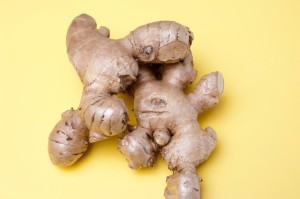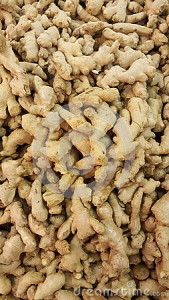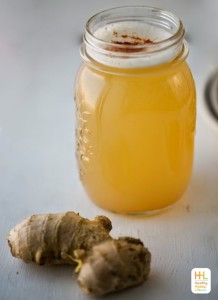
One of the most commonly used spices worldwide is ginger. Known in Hindi as adrak, ginger has been used in India since before 200 B.C. Ginger decreases Vata and Kapha doshas and increases Pitta. In Ayurveda, the health benefits of ginger are vast.
Dry ginger has a bitter and pungent rasa (initial taste); it is heating. Its vipak or post digestive effect is pungent. Fresh ginger has a pungent rasa. Its virya or energetic effect is heating; and its vipak is sweet.
Ginger’s botanical name is Zingiber officinale. It belongs to the Zingiberaceae family. Its “family” members include turmeric and cardamom.
Ginger is used to kindle agni, or the digestive fire. Thus, ginger improves digestion and assimilation. Consequently, ginger helps burn ama, or toxins from the body. Another of the health benefits of ginger is that it reduces nausea. It is a heart tonic and supports healthy circulation, is a vasodilator, anti-coagulant and it increases sweating. Ginger also has a propensity towards the lungs. It’s a decongestant and expectorant which aids in removing excess Kapha. Ginger helps fight colds and flu and relieves sore throats and respiratory infections.
 The majority of the world’s ginger is grown in India and China. The rhizome is the most commonly used part of ginger. It’s the ginger root. Unless you are using large chunks of ginger in soups, vegetables or as a tea, it’s best to peel it. The skin can get moldy when it becomes dry.
The majority of the world’s ginger is grown in India and China. The rhizome is the most commonly used part of ginger. It’s the ginger root. Unless you are using large chunks of ginger in soups, vegetables or as a tea, it’s best to peel it. The skin can get moldy when it becomes dry.
Ginger is used in root, powder form, juice, or extract form. Certain Ayurvedic massage oils contain ginger. The primary active compound in ginger is gingerol. Gingerol gives ginger many of its antioxidant and anti-inflammatory medicinal properties. Ayurvedic joint health formulas such as Kaishore Guggulu and Yogaraj Guggulu contain ginger.
Other health benefits of ginger are that it’s a source of Vitamin C, ascorbic acid, thiamine, and niacin. Ginger’s also a carminative which relieves intestinal gas, pain, and distention.
The following are some Ayurvedic health remedies utilizing ginger in its various forms:
- To kindle agni before meals, chew a bit of peeled ginger, with a squeeze of lime, and pinch of mineral salt
- Add ginger powder, cinnamon powder, cardamon, and nutmeg to your coffee, black tea, or chai to help neutralize the caffeine toxicity
- Take 1 tsp each of fresh ginger juice and fresh onion juice to reduce nausea and vomiting
- Take 2 ginger capsules an hour before flight to prevent jet lag
- Take a ginger tincture as an antidote for motion sickness
- For sinus headaches, take ½ tsp of ginger powder, mix with sufficient water to make a paste, and then apply topically
- For cold, congestion, cough or flu symptoms, boil 1 tsp each of ginger powder, cinnamon powder, and fennel powder in 1 cup of water. (Do not microwave!)
- For sinus congestion, take 5 drops of fresh ginger juice or tincture and 1 tsp of raw, uncooked honey twice or thrice daily
- For a hoarse voice, mix 1 tsp of ginger juice, 1 tsp of lime juice, and 2 pinches of rock salt together
- For sound sleep, take 2 cloves of chopped garlic, 1 tsp of turmeric, a pinch of ginger powder, a pinch of cardamom and boil in 1 cup of milk
- To reduce fever, drink a tea made with 1 tsp of ginger powder and 1 tsp of tulsi powder
- To treat fever – make a tea with 1 tsp each of cumin seeds, coriander seeds, fennel seeds, and ginger powder. Steep in hot water for 10 minutes, strain, and drink
- For rheumatoid arthritis, take 1-2 tbsp of castor oil in ginger tea before bed
-

Ginger tea – pinterest.com/pin/85779567878607519/ Rub fresh ginger juice or ginger oil around the belly button to stop diarrhea or calm a stomach ache
- To relieve sore muscles, do an oil massage with Mahanarayan oil, then soak in a bathtub with 1/3 cup of ginger powder and 1/3 cup of baking soda for half an hour
- For joint or arthritis pain, warm ginger pieces in sesame oil and apply topically
- For dysmennorhea, take 1 tsp of ginger juice with 1 tsp of aloe vera, and a pinch of black pepper
Ginger also contains salicylates, compounds found commonly in many blood thinning herbs. Please talk to your doctor before taking ginger with aspirin. If you are on prescription medication, please also check with your physician before taking ginger or any other herbal supplements.
Ayurveda has traditionally used ginger powder and root in its cooking. As you can see, there are numerous health benefits of ginger. So pick up some ginger in root, powder form, tincture, or massage oil form and learn how it can help you.